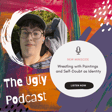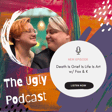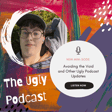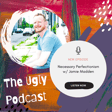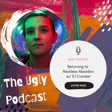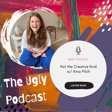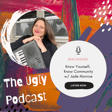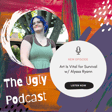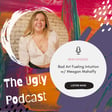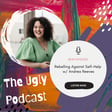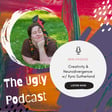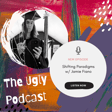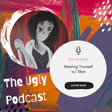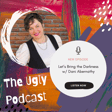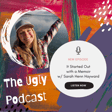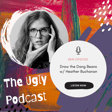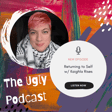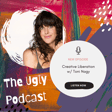Introduction to The Ugly Podcast
00:00:03
Speaker
Welcome to the Ugly Podcast. I'm your host, Lauren Alexander, she, they, and this is the place where creatives are encouraged to make messy, ugly art and let go of perfectionism.
00:00:14
Speaker
I started this podcast with my creative partner, Emerson, and we've since grown into our businesses. And this podcast is now evolving into a space where I interview other creatives to discuss our creative processes and how we navigate the mental mind field of creativity. This podcast serves as a reminder that you and your art get to be whatever the hell you want to be, ugly and all. Welcome to The Ugly Podcast.
00:00:44
Speaker
Thank you for coming back two weeks after two weeks.
Meet Meg McIntyre
00:00:51
Speaker
Today, I'm so excited to introduce my guest, who is a developmental editor, writer, journalist, and certified gateless writing teacher. She helps indie and querying authors amplify their voices through the power of craft.
00:01:07
Speaker
Welcome. Can you please state your name and your pronouns for everybody? Yeah. Thank you for having me. My name is Meg McIntyre and my pronouns are she her. Yay. Thank you. Yeah.
00:01:22
Speaker
We have been hanging out all day today for various things. First, starting off with our writing sprints this morning, which thank you so much for that. Yeah, I think most of what I wrote this morning was total crap, but I did find some interesting aspects of the arc that I want my character to go through. So it's like, ah, that's what I was missing. So the content and what actually happened was garbage, but what I found in there was really great.
00:01:50
Speaker
Oh yeah, I feel like that's what sprints are best for is just like, I'm going forward until I figure out where it's going and then I'll go back and fix the actual in between later on. Exactly. Oh, much appreciated.
00:02:05
Speaker
Um, yeah, we've been writing a lot together recently, uh, one because you joined the writer's helm, but then also you started running these, um, gateless writing
The Power of Gateless Writing
00:02:13
Speaker
salons. You had your first one, uh, last week. Yes. Last week. Yeah. Um, which I joined and was so good and we're going to go more into it.
00:02:25
Speaker
as I ask you questions, but I did want to start just like by saying I really was like, so December has been a dark month for me. It always is, you know, the darkness just really hits me. And so like my creativity has been just like, I haven't been as interested in creating. And so I went into your gateless writing salon thinking like, oh my God, I still want to write. I don't know what to say.
00:02:53
Speaker
But the way you presented it and then just the encouragement and the feedback that everybody gives during that time, I felt electrified afterward. Granted, it faded within 24 hours, but damn it, I was electrified for an evening and that's all I needed.
00:03:13
Speaker
It felt really good. And so thank you so much for that. No, thank you. That makes me so happy to hear that's like the same exact word that I would use probably for how it makes me feel and why I kind of keep going back. And that's exactly why I go almost every single week to the gateless salon because it's just such a great feeling. And I wish I could feel like that all the time. So it's awesome to have you there. Yay.
00:03:41
Speaker
I know. It's like, why can't I just love my writing this much every day? Yeah. Anyway. Yes. So tell me a bit more about just your background in writing. How has your relationship to writing changed over the years?
Meg's Writing Journey
00:03:58
Speaker
Were you a super creative kid?
00:04:01
Speaker
Yeah, I would say I've been writing kind of as long as I can remember I was a really early reader and I kind of immersed myself in books from a really young age and so I started very early as well kind of trying to replicate that with my own writing.
00:04:17
Speaker
I kind of always had a goal when I was a kid of, you know, one day I'm going to write my own books. I also used to say that I was going to illustrate my own books, but that side of my creativity never really blossomed. So we stick to the writing. But I, you know, continued to write throughout high school and then in college I decided to study creative writing and journalism as well. And part of the reason for that was that,
00:04:47
Speaker
I found it really difficult to kind of find confidence and momentum in the creative writing side of my writing practice. I had gotten a lot of feedback kind of in college and earlier that I was good at certain things in terms of how I use the language, but that there wasn't always a lot of substance behind what I wrote. And so I think I kind of turned to journalism because I felt like it was a way for me to use my writing skills without ever having to worry about having
00:05:22
Speaker
and stringing the story together. And so I felt like that was a safer choice. And then I pursued journalism for a few years, but eventually kind of decided that I wanted to start my own business. And that was really when the transition sort of started happening, where I kind of returned to my creative writing practice a little bit and found my way back to where I am now.
00:05:44
Speaker
something to say, like it's basically taking other people's words
00:05:50
Speaker
There's been a lot of ups and downs for sure with my writing journey. I love that. Okay. Did this happen similarly for you? Because like, when I started freelance editing, I started seeing other writers doing their thing and telling their stories. And then there's just that something in the back of my head that was just like, Oh, you want to do that? Don't you? You really want to do that?
00:06:13
Speaker
And even though I hadn't written in years, I just was like, no, I want to be part of these people's lives and I want to do what they're doing. Is that like how it happened for you too? Absolutely. I mean, I think also just kind of specifically with the authors that I work with, seeing so many
00:06:32
Speaker
indie authors just put themselves out there with so much force and gusto and really like lean into their work and and not need that approval or that like establishment um to tell them that their work was worthy that was super inspiring to me and it kind of made me feel like well why can't why can't i do that too then and um that sparked it a little bit and i think i always had had the underlying dream still there of like you know one day i'm gonna get back to that one day i'm gonna
00:07:01
Speaker
Um, try to prioritize that in my life more, but I don't think it was until I really started leaning into my editing business and really trying to get more integrated into the writing community that I was like, Oh, I do need to do this. Like, this is something that I need to pursue, um, on a creative level for my, for my own self and like my own soul. So yeah, huge part of it for sure. Yeah.
00:07:28
Speaker
So then when did Gateless writing come along?
Gateless Writing Explained
00:07:33
Speaker
And what is it? Yeah, so Gateless writing is essentially, it's a methodology that is all about kind of tapping into deeper creativity and getting past
00:07:48
Speaker
self judgment and like this conditioning that we get from society about what is good or what is worth it or what is important that kind of keeps us from from making things right like it's so easy to get frozen by the idea of well why should I even try
00:08:03
Speaker
This is not as good as anything anybody else is doing or second guessing. And so, gateless writing is basically like this communal space where people come together to create and it's based in both neuroscience and Zen principles. So it's kind of like marrying this idea of like spirituality in a sense with science and trying to get at the heart of like what really helps creativity thrive.
00:08:32
Speaker
underlying idea is that criticism is not the thing that makes it thrive. Like that's not what makes us feel expansive and creative and willing to explore. And so I had never heard of this before a friend invited me to an in-person gateless writing group in my area. And this actually was created by
00:08:57
Speaker
um an author and Fulbright scholar who previously lived in the town where I lived so I think it has kind of a hold in this area that I live in because it really started here um but I didn't really know much about it at all all my friend told me was that it was a writing group you would go there would be a prompt um you would write and then read and get feedback but nobody was gonna say anything
00:09:20
Speaker
about how they thought your piece should be improved or what would make it better. And when I first heard that, I was kind of skeptical. I was like, well, how are you going to make it better if people are going to sugarcoat it or if they're going to kind of give you the soft version?
00:09:38
Speaker
And I could not have been more wrong about what it actually is and how it actually feels. Because at the end of the day, it's not really actually about the feedback itself. It's more about creating an environment where your brain is ready to explore and experiment and try new things. And the feedback is wonderful. I mean, it's an amazing supportive community and environment, but
00:10:03
Speaker
the actual words and the actual feedback are not as important as kind of priming you for that creative mindset. And so after I went once, I started going back almost every single week. And then that led to the leader of my group, you know, she had let us know there was a training coming up for people that were interested in learning how to implement this method. And I was like, well, I probably
00:10:31
Speaker
can't afford something like that like maybe this is just kind of an unrealistic idea but I went for it and I ended up attending that training and it was an amazing just like transformational experience with so many interesting
00:10:47
Speaker
just really like profoundly bold and intelligent and creative people. And that's one of the things that I think is so cool about Gateless is that it's not just for writers and it's not just for creators. There were people at this training who were planning to take it and use it in trauma work or grief counseling or working with people who are incarcerated or working in corporate settings
00:11:13
Speaker
and all of these different kind of disciplines. And so it's just something that can really be adapted. And at the core of it all is that we're getting deeper in touch with ourself through the writing. And that's because we're letting go of those inhibitions and that anxiety of how it's going to be received. We're letting ourselves be authentic on the page.
00:11:39
Speaker
Yeah, that was one of the most powerful things about it for me is was one of your rules was you can't explain your writing before you read it. You can't disclaim it.
00:11:52
Speaker
that was so hard for me. I was just like, No, Lord, it's one of the rules. You can't do it. I was like, but I need to explain that it's not finished. And you can't, you can't. And so but like, in doing that, and not saying that and reading it and letting it be what it was, and then still receiving that feedback of what is strong about it, it like,
00:12:20
Speaker
it just like energizes you. You're like, oh wait, like it, one, it doesn't need to be perfect to have value to, it doesn't need to be done. And I can take all this feedback and improve it later and change it and whatever. But like, yeah, that feeling of just letting it be and sitting in that authenticity was so powerful. Yeah, exactly. I love that you said it doesn't need to be perfect because that is like,
00:12:45
Speaker
the heart of it all. And that fits so well with you as well and your philosophy as an editor. And that's why the guidelines exist because we have that impulse, right, to kind of preface or tell people, well, this is why this is the way it is.
00:13:05
Speaker
kind of stepping away from that really helps us start to separate the work from us as the person and see the work can exist outside of me. It's something that can be in flux. It can change. Like you said, I can go back and I can edit it. But also, even if I don't, it's OK that it just exists outside of me as it is. And there's still something beautiful that I can find about it, even if it's not what I would call perfect.
00:13:35
Speaker
And that's what it's all about, is creating the environment where you feel safe to let that happen. Even if it feels uncomfortable sometimes, because it will. We all still have that inner critic inside of us that's going to be like, what are you doing? People are going to hate this. But the more you do it, the more natural it starts to feel. And the more it starts to kind of seep into the rest of your life and your writing practice as a whole. Yeah, absolutely.
Impact of Criticism on Creativity
00:14:05
Speaker
We have this idea that everything we do has to be good or have value. This belief leads us to burn out. It can hold us back from creating altogether. But in my Ugly Art 101 course, I break down these restrictive beliefs and lead you through exercises that intentionally subvert perfectionism and bring playfulness back into your creative process. You can get the first day absolutely free by going to my website, scribeandsunshine.com and signing up on the homepage. Join me in my weird ugly art revolution. Back to the show.
00:14:38
Speaker
I think I see the gateless writing method as kind of like the next step.
00:14:44
Speaker
in my creative journey because like where I started making ugly art, I had to have it in my head of like, this is going to be bad. I'm going to make it bad on purpose in order to bring myself to the page. And that was like step one in releasing this creative part of me. And it's not always ugly. It's more of like the mindset of like, no, I'm going to go in. It can be what it is. That was step one. And now step two is like,
00:15:11
Speaker
It can be, I can just make things and they may be beautiful or not. And it's finding the beauty in everything I make. And especially with writing, because writing has been one of those sticking points for me where like, I'm fine showing my terrible, ugly drawings and paintings. I'm totally fine with that. But when it comes to my writing, I really hang on to it.
00:15:34
Speaker
I don't want to share that. So that has been the hardest part for me. And so I feel like this gateless method has really helped me start to take that next step into my creative journey. Yes. Yeah, that's so true. Because I love that concept of ugly art and doing things bad on purpose.
00:15:59
Speaker
And same with, you know, when you're writing a first draft, we as editors talk so much about how your first draft is not supposed to be good, like that's, you have to get through the bad to get to the good. But I think it's also kind of
00:16:14
Speaker
with that progression, it's like moving beyond seeing things as good or bad in a way. It's just like accepting how things are and recognizing what's powerful about it or what's resonant without it having to be like a value judgment. And that's part of why the communal aspect of Gateless is so important as well because you're not just sharing your own writing, you're listening to writing from other writers and you are
00:16:44
Speaker
creating this laser focus on what you're finding inspiring in their piece.
00:16:50
Speaker
Having that mindset shift of just training yourself to focus on the positive can have such an impact on your life beyond that gateless circle because it really, studies show that this does affect the way that your brain works. It can start to help you build new neural pathways. And so when we're focusing on what we see that is inspiring or resonant or strong coming out of other people's writing, it makes it a lot easier to see it in our own writing.
00:17:18
Speaker
And that can translate to so many other parts of our lives too. Well, and that's, I mean, that mirrors what your work in journalism has turned into, which I don't think, I don't know if I mentioned it here, but like you're involved with solutions journalism, which I had never heard of that term before you. But that idea of focusing on what good things are happening in the world, instead of the constant, you know, 24 hour news cycle of what's terrible, it's,
00:17:48
Speaker
Right. It's a really beautiful way of shifting and not in like a toxic positive way, but just shifting on finding what is inspiring to you and and what good things are changing and shifting in the world. Yeah. Yeah. And that's that's such an important thing, I think, like when we are talking about solutions journalism specifically, solutions journalism is all about reporting on responses to problems just as vigorously as reporting on the problems themselves.
00:18:17
Speaker
And it's really important to shift that mindset because we actually have something called negativity bias as humans where because of the way we evolved, we are used to constantly being on alert for threats. And that means that we are overly critical. We're constantly looking for things that might be a threat to us, but.
00:18:36
Speaker
with the processes that happen in the brain that actually doesn't put us in a great place for solving problems. Like that puts us in a place for an immediate reaction when we kind of need to make a split second decision of fight or flight and things like that. But when we're trying to solve some of these big societal problems, negativity bias really holds us back because it kind of keeps us in the mindset of there not being solutions.
00:19:03
Speaker
And I think the critic kind of works the same way with creative writing where the more that you feed it, the bigger it becomes. The more it starts to seem like I'm never going to get better. Nothing that I write is ever going to be good enough. Why should I even try? And so instead of feeding the critic, Gateless is about feeding the positive side, like the light, what's already shining. Because what we put our effort into and what we focus our attention on is what's going to grow.
00:19:33
Speaker
Mm hmm. Absolutely. Yeah. So tell me more about what was happening in your life and in your writing practice that kind of drew you to gateless writing. What was it about attending that first session where you were like, Oh God, this is
00:19:49
Speaker
This is such a better answer than the path I'd been pursuing. Yeah. I think especially coming out of the environment I was in in college while I was doing my English creative writing degree, I was in a lot of writing workshops in that traditional setting where it is very focused on critical feedback.
00:20:17
Speaker
Um, and I never really felt like I was part of a community in those settings. Like it always felt very competitive and it felt like people were trying to kind of prove themselves. Um, and that was not a comfortable place for me and I always felt out of place. I felt like I was not, um, at a level that I needed to be to really
00:20:40
Speaker
kind of go for a career as a writer in like literary spaces. And I had been told, like I said before, kind of over and over that my writing was linguistically interesting and that there was some great stuff going on in terms of like how I was using different literary devices and things like that, but that there wasn't substance and there wasn't
00:21:08
Speaker
kind of a thematic underpinning that was there.
Finding Community in Writing
00:21:12
Speaker
So I think before I had come into gateless writing, I really believed, I had a core limiting belief that I did not have anything to say. Like I just thought that I didn't have good ideas. I thought that, you know, I was good with the words aspect of writing, but not with kind of like the soul aspect or like
00:21:34
Speaker
the idea of translating the human condition, like all these things. And I think I kind of had an idea about writing and being a writer that you had to take yourself really seriously in a way that I wasn't necessarily looking at myself. And I didn't have, you know, I had friends who were journalists, but I didn't have a lot of friends who were
00:21:59
Speaker
you know, really within the creative writing literary space or like submitting for publication or working on novels, like I just didn't really have a community in that aspect. And so when I went to my first gateless writing session, I was just kind of blown away by how much I felt seen.
00:22:20
Speaker
in that space and kind of respected for like what I was doing and what I was bringing to the table by people that I had never met before and also how inspired I was by the writing that they were bringing to the table. Like I really wasn't sure what to expect. I had only tried out a couple of other like in-person writing groups that were more for
00:22:44
Speaker
like people who were kind of just starting out or people who were retired and always wanted to try writing. So not necessarily people who were looking at this as something that they wanted to do professionally. And so I just really had no idea what to expect. And then when I got there, I just felt, I felt like I belonged there. And that was the biggest thing for me, I think. That made me feel like, okay, this is something that,
00:23:12
Speaker
every time I come away from one of these sessions, I feel good. I just feel good about myself and my art and the people that I know and the people who are writing with me. Like it felt like I had kind of support for the first time in a writing community that I hadn't had before. And I feel like I have always kind of like felt
00:23:44
Speaker
Like it was part of my purpose to try to create that sense of support and that kind of an environment where people feel like they're heard. I feel like that's part of my mission to help people feel like they're heard. And so even though I knew that it was a big risk and a big commitment kind of going for my certification and getting trained, I felt so pulled to do it.
00:24:10
Speaker
Now that I've gone through that and I'm starting to lead my own my own gateless lawns, I just feel like it was the best decision I could have made at that point. Not just for my career, but like, for my soul as a person. Like, yeah, it really does reach into other parts of your life in ways that you you might not realize at the time when you're sitting in that salon. Yeah.
00:24:35
Speaker
finally finding that space where you feel validated is you I mean you just like you can't overstate it enough like how valuable that is yeah
00:24:52
Speaker
And especially, like you said, writers are often thought of as these very serious people with serious deadlines and serious stories to tell that follow specific formulas and are going to get a million dollar book deal. And like that, like those people are writers. I am not those things. So therefore I'm not a writer.
00:25:15
Speaker
So finding that space of, no, you are a writer. Look at all of these amazing things that you've had to say and look at how interestingly you said them. That fuel for a writer, it just keeps you going. It inspires you to do more and see what else you can say. Exactly. What's inside of me that I don't even know is there?
00:25:42
Speaker
Yes, because that's the other thing. You know, with every gateless session, it usually starts with like a meditation or reflection. It kind of depends on the leader and who's leading it. I've seen people do everything from kind of a straight meditation like I did last week to a vocal exercise to doing some creative movement or dance to some comedy things like
00:26:06
Speaker
doing laughing exercises. There's all kinds of things. And the whole point of that is to help you feel more connected to your body and yourself so that once you get that prompt and you're ready to move into the writing, that you are in that space of deeper connection with those inner truths that you might not have even realized were there. And I think what you were saying about
00:26:34
Speaker
being a serious writer and sticking to deadlines and having these big projects. The other thing I love about Gateless is that it's just writing for the sake of writing. Like some people do work on ongoing projects during Gateless sessions, but a lot of the time people just come and write whatever comes out that night. And it might not ever make it out of that circle. It might not ever get published anywhere. It might not even be read again by the writer.
00:27:00
Speaker
But the writer wrote that day. They sat down and they made time for their art and they created something. And there's something really powerful in that, in just creating for the sake of creating without some end goal of becoming published or reaching some kind of arbitrary marker of success with the writing. Yes, exactly. Oh, so good.
00:27:29
Speaker
So where do you think we have come up with this idea that criticism is the best way forward? Like harsh truths. And I put those in quotation marks because what is a truth when it comes to critique? It's all subjective. So like, where did we get this idea of like, no, this is the right way, the correct way to write. And you don't write this way. So you need to change this, this and this. Yeah. Yeah. I mean, I honestly think
00:27:59
Speaker
A lot of it comes from just gatekeeping and like the system that we've always had to kind of decide what is worthy of our attention and what is not. I think it's really grown out of that and also obviously we have so many systemic issues in this country and beyond in terms of
00:28:20
Speaker
whose voice gets to be heard and whose voice gets to matter, people who have consistently been silenced and marginalized. And so I think a lot of it comes from that and our system of trying to decide who gets to belong, really. There's some really interesting writing about this.
00:28:41
Speaker
One piece in particular that I am thinking of was in the Harvard Business Review a few years back. I'm blanking on the actual name of it right at this moment. But it's all about this idea of criticism and constructive feedback and the fallacies involved with it. And it's interesting because I think it's something that I saw a lot
00:29:05
Speaker
when I was working full time as a journalist as well. Because journalism is an industry where it's a difficult environment and it's kind of repeatedly drilled into that this is a calling and this is supposed to be part of your identity. And if you don't have a thick enough skin or if you can't handle criticism or if you can't handle
00:29:32
Speaker
kind of the conditions of the job, then you just can't hack it. And that's that. Without ever kind of having any understanding or work to make those conditions.
00:29:46
Speaker
better in a way that would actually improve the information that we're able to share with people. But sorry, I won't go off on a tangent because I could talk about that forever. But I think this permeates so many aspects of our society of feeling like there has to be some kind of sense of authority of who gets to say, this is how things must be done. And if you don't do them that way, then it's the wrong way. And there's always going to be
00:30:15
Speaker
a need for feedback about how to improve things, right? Like as editors, that's part of our job is giving feedback, but it can be done gatelessly, believe it or not. Like we can focus instead of nitpicking and saying like, here are the 10 million things that I found wrong in your manuscript. We can say, here are the things that are already really shining. Here are some tools and resources for how you can make them stand out even more, improve them even more.
00:30:43
Speaker
And here's what you should focus on when you're working on it. So I think this idea of criticism and harsh truths, like you said, so much of it is subjective. And unfortunately, so much of it is really meant to put people in their place. And that's not what we should be striving for when we want more voices out in the world, not less.
00:31:11
Speaker
Yes. And not just more voices, but more ideas. Like when we put everything in this formula of your book needs to follow these steps and have this kind of arc, then what kind of new stories are we dismissing?
00:31:27
Speaker
Like they remake movies every single year and it feels like it gets harder and harder to find something new and unique. I mean, obviously I'm not talking about like indie films and stuff, but like indie films are where that like amazing creativity and new ideas actually bloom because you're not saying like I'm following this formula and I have achieved these criteria. It's like, no, you're exploring these areas that haven't been explored before. That's what creativity should
00:31:56
Speaker
be. It should be embracing all of that unknown and being curious about how else we can tell stories, who else has stories to tell. Yeah. Right. And I think it's important too to make the distinction between this brutal criticism
00:32:17
Speaker
and the concept of rejection in general, right? Because throughout our writing careers, there's always going to be rejection. There are going to be times when people don't want to publish the writing that we put forward. But when you start this process of digging deeper and recognizing the inner critic and starting to notice when it comes up in your everyday life and where that comes from and really practicing going to the page and writing without inhibitions,
00:32:47
Speaker
Rejection becomes a lot easier to face because you start to realize like this doesn't say anything about me as a person Yeah, all this says is that this specific piece? Wasn't meant for this opportunity or this this wasn't the right fit and that separation of self that you start to see really helps you approach those situations from an understanding of
00:33:13
Speaker
There's still power in me. I'm still creating work that is resident. I'm still creating work that is strong. And this rejection is not sort of a statement on my worth as a person. Yes. And that's the most important thing for creatives in order to keep creating.
00:33:35
Speaker
In order to keep writing, you have to feel like you have power over this thing. And when you let the rejections tell you where your power lies, then you're going to feel powerless. Yeah. What we focus on is what grows. Exactly.
Creativity and Risk-Taking
00:33:56
Speaker
Hey, writer. Are you feeling adrift in your writing practice? Like the word swept you out to sea, but you have no idea where you're going.
00:34:03
Speaker
climb aboard The Writer's Helm. I'm Lauren. And I'm Gabby. And we're both writers and professional editors who are here to support you on your writing voyage. With The Writer's Helm, you get access to group co-writing sessions, Q&A sessions, our private community chat room, and group coaching calls to help you along no matter what stage of the writing process you're in. Members of our crew have said that they've reconnected with their excitement for writing and feel energized from the support they've received from us and each other.
00:34:29
Speaker
You can sign up for The Writer's Helm at any time, which comes with a one-week free trial to make sure that we're the right crew for you. You don't need to navigate these stormy seas alone. Let The Writer's Helm take you to New Shores. So, how have you seen your own writing evolve since shifting to the Gala's Method? I would say that I have seen myself taking a lot more risks on the page.
00:35:00
Speaker
trying new things, pushing myself outside of my comfort zone, but also just letting the words come a lot more naturally. I think we all have had those moments where you type something and then you erase everything and then you type a few more words and then you backspace again. When I'm in a gateless session, I'm really intentional about not
00:35:24
Speaker
scratching things out if I can help it, not erasing things if I can help it, and just kind of letting things evolve how they will. And also not planning. And that is such a big thing for me specifically. I have always been a huge planner. Part of it was just the environment that I was raised in and those kinds of things, but a lot of it was also
00:35:52
Speaker
you know, when I was growing up, I did not yet know that I had ADHD. And so I was very like trying to counteract the effects of that. And so there's something really freeing for me about going to the page and just not having a plan, complete improvisation. And I think that's made me a lot more accepting of what comes out and just like willing to
00:36:22
Speaker
let it fall away if it's not something I'm proud of. Not every piece that I come out of a gateless session with is something that I'm in love with and want to publish, but I'm still glad that it exists and that I took the time
00:36:38
Speaker
to go to the page and work out whatever I needed to work out by writing that thing. Because I think the longer you do Gateless, what you also start to realize is that what tends to come out on the page is what you feel pulled to talk about, the thing that's like kind of bothering you. Whether that comes out in a prose poem or a short little story set on another world, like it could be anything, but it really does help you see kind of what is
00:37:09
Speaker
what is wanting to get out. So I feel like I have gotten just so much more in tune with that kind of inner voice since I started.
00:37:20
Speaker
writing with Gateless. And I've gotten more comfortable sharing my work. You know, this year was the first year that I started submitting things to literary journals and magazines. I actually have something coming out in a zine this week, I think. So by the time, well, by the time your listeners hear this, it'll be several weeks ago. But, you know, just like being willing to put myself out there more and
00:37:48
Speaker
and try things and not being as scared of what the result will be because even if this opportunity is not it, I know that there's a space where I can go and feel validated and know that there is something worthy in my writing, no matter how it's received kind of beyond that circle.
00:38:09
Speaker
Yes, I love that. First of all, congratulations. Thank you. No, obviously you've been published before because you're a journalist. Yeah, I mean, it's my first creative publication since college. So like as an adult, I guess you could say. Yeah, I mean, I've been published a lot as a journalist, but it's just a different thing when it's something that completely came from you versus
00:38:40
Speaker
something based on research and interviews and that kind of thing. So yeah, thank you. So exciting. Yeah, there's so much power in that, in that releasing of
00:38:54
Speaker
of the writing as a part of you. It's like, nope, it's separate, and it gets to go do its own thing. You can maybe direct where it goes, kind of like a little child, but not in a human firm, obviously.
00:39:11
Speaker
send it off to preschool and see if people there like it. And maybe they'll send it back and be like, no, thank you. Don't want your child. But that doesn't mean that your child is bad. Just means your child is either going to stay home with you or go somewhere
Symbolism of Reading Aloud
00:39:25
Speaker
else. Well, and that's part of the reason that we read aloud in Gateless because it's all about like letting it go, letting it into the air. Like the idea is that
00:39:38
Speaker
you get it out once when you put it down on the page and then when you speak it aloud, you're like fully releasing it so that it's like no longer kind of integral with you, which I really love just like the symbolism behind that. Yeah, I really like that. I can't remember what I was reading not that long ago that I was talking about
00:40:03
Speaker
the importance of reading aloud and how long ago when we first started telling stories, we told them aloud. And then even once we started writing things down, we still shared those things aloud
00:40:19
Speaker
in theaters and you know to crowds of people like you had something to say that's why you wrote it down and now the next step is speaking it and letting people hear it and I feel like there's so much fear around that last part of wait people have to hear this yeah oh no like that's that last part of just letting it go that we have such a hard time with so that's so powerful that
00:40:46
Speaker
through this method that we can practice doing that and practice learning that that's safe. It's safe to do so. Yeah. And, you know, there is such a vulnerability in that in putting your voice to your writing in that way, but it can be so cathartic. Like there were times when I was at the the training where I earned my gateless certification that I could not get through a piece without crying.
00:41:16
Speaker
And that's a sign that you are going deep, that it's working because you're letting yourself go into those places that
00:41:26
Speaker
you kind of haven't let yourself look at for a really long time. Um, and there's power in someone else hearing that and witnessing that and supporting you through that as well. And that doesn't mean that every gateless session is going to be emotional or has to be emotional. I don't want to scare anybody away who is not ready to cry in front of other people. Like this was obviously a session of practiced like gateless writers and practitioners. So it was like a very unique environment, but, um,
00:41:55
Speaker
When you do get the opportunity to go to that deep, it's such a transformational experience and just letting yourself feel it is a big part of it. It's a big part of it. It's okay if your voice shakes. It's okay if your voice shakes when you read it because we still want to hear it. All right.
00:42:21
Speaker
one small thing that writers and creatives could do today after listening to this podcast that will give them a taste of what the gateless method has to teach them to offer them.
Gateless Writing Tips
00:42:35
Speaker
Yeah, I would say that one way that you can kind of dip your toe into this at home on your own is
00:42:43
Speaker
kind of start trying to see what it feels like to incorporate meditation or something some other kind of spiritual practice into your writing see what it feels like to maybe meditate for like
00:42:55
Speaker
two or three minutes, you can use an app. There are plenty of YouTube videos. Try that before getting into your writing session and then give yourself a time limit. In gateless sessions, we usually do 20 to 25, but you can do as little as 10 to 15. Try really hard to just let yourself write for that time. Don't delete, don't edit, just let whatever comes out come out.
00:43:24
Speaker
When you're done with it, you can even read it aloud to yourself. It's okay if you're in a room by yourself reading aloud. That might feel a little strange at first, but it can actually be a really, really wonderful feeling to kind of hear it out loud. And you can start to practice looking for what you like. It doesn't necessarily need to go any deeper than that at first. You can just say, okay, well, I like
00:43:48
Speaker
this specific word that I used or that image that I had or the way that this idea showed up again at the end of the piece. And you can start to see just by doing that on your own how it can start to shift. And once you feel comfortable with that, I absolutely recommend coming to a Gateless session, experiencing what this is like in a group because that's where the magic really, really happens. And you can kind of start to feel
00:44:16
Speaker
the magnetic just like atmosphere of that and everybody feeding off of each other. So definitely feel free to try it on your own first if you're a little intimidated, but I 100% recommend getting into that group at some point and getting the whole experience. I second that and you have some opportunities coming up that where people can
00:44:40
Speaker
yeah so when you when are those going to be. So this winter i'm going to be doing three salons and once a month for January, February and March. The first one is going to be on Saturday January 21 and that is going to be.
00:44:59
Speaker
at 1 p.m. Eastern time so I'll be in the morning on the west coast and I know I have some people in my community who are over in Europe who wanted to be able to attend too so hopefully that'll be a good time for everyone. And in February I have two salons happening. I'll have a virtual salon on Saturday the 18th at the same time and then I'll also be doing one in the writer's helm on February 22nd.
00:45:25
Speaker
Um, so that will be a really fun one. That one is going to be free for members and then there's a fee for non-members. And then the last one I'll have this winter is going to be in March on the 18th, another Saturday in the afternoon. Um, and those, you can either sign up for one session or if you sign up for all three at once, um, you do get a little bit of a discount. So something to keep in mind.
Get Involved with Gateless Writing
00:45:49
Speaker
But yeah, I'm excited for those sessions and I definitely will be gathering feedback from those as well on how people want to see it evolve going forward because there's so many different ways to structure it and so many different ways that people can use GateList. So I want it to be something that's driven by the community that people feel like they had a role in creating.
00:46:12
Speaker
I just can't wait to see how it evolves. So yeah, I'm so excited. I might sign up for those as well. I mean, I'll definitely be there for the writer someone obviously, but the other ones I am definitely.
00:46:26
Speaker
probably going to be there. I can't wait. I would love to see you. Amazing. I love it. And then my final question, which I ask every guest who comes onto the Ugly podcast is what is something ugly you've made recently? Let's see. I can share mine if you need to think.
00:46:51
Speaker
Yeah, why don't you share first? Mine, which I already talked, I touched on it at the top of the episode. But yeah, the the scene that I wrote this morning during our writing sprints was truly terrible. At one point I was like, why is this character even in the book?
00:47:11
Speaker
I hate this character so much. I need him gone. And then I was like, you know what? Let's just see where this conversation with this dude goes. But like I said, I just kept going. I knew it was terrible. And it was like, you're just going to keep getting as many words out as you can. And then sure enough, the conversation led where I needed it to go. I figured out where this character is going to figure her shit out.
00:47:40
Speaker
It ended up being good, but it is truly awful. No, I love that. That's great. I think probably the most recent
00:47:54
Speaker
ugly thing that I made. I have one of those relaxation coloring books. But I'm not great with picking color palettes. And I usually just get way too worked up over it trying to figure out which colors I'm going to use and all these things. But recently I was doing it just to have something to do with my hands while I was listening to
00:48:18
Speaker
audiobook and I was just like you know what I'm just going to pick whatever colors I feel like at the moment and use them and like it will look like what it looks like and it was it was not pretty but but it was like kind of meditative still you know just like the act of of doing that and um having something to do with my hands but also it being something where I was kind of like using my creative brain so yeah yeah that's something that
00:48:49
Speaker
since I was like three years old, I have gotten way too intense about coloring and picking the right colors. So I feel like it's a pretty big step for me to just like, to just let it go and have the color scheme be so good. That is the power of ugly art.
00:49:10
Speaker
Really, really, it is. Well, thank you so much for joining me. Where can people find you? How can they connect with you? So I'm on social media, all the regular platforms at Buy Meg McIntyre.
00:49:28
Speaker
be as in boy why Meg McIntyre like my byline. And then my website is mackentireeditorial.com and you can go there to get more information about workshops or you can sign up for my newsletter to kind of be the first one to know about those things. And I'll also be having some kind of newsletter specific discounts and promotions in the new year. So that's definitely something you might want to get on if you are interested in a salon and would like something to help make it more affordable.
00:49:57
Speaker
Yeah, reach out. I would love to hear from you and connect with you whatever way feels best. Amazing. And Meg's newsletters are really great as well because she has this whole list of resources at the bottom, not just her own, but from other editors in the community, other coaches, other creatives, just so many great resources in that newsletter. So highly recommend. Thank you. Thank you so much. This was such a great conversation. Thank you.
00:50:27
Speaker
Thank you for all you've done with the Gateless writing. I look forward to future sessions and yeah, felt so good about that. So thank you. Awesome. I can't wait. Thank you so much for having me. And thank you everybody for listening.
Conclusion and Embracing Imperfection
00:50:45
Speaker
The Ugly podcast is created by me, Lauren Alexander of Scribe and Sunshine. It is produced and sort of edited, also by me, and written and directed by absolutely nobody. If you like the podcast, be sure to rate and leave a review on your preferred platform and share with the creative people in your life. If you're interested in learning more about what I do, head to scribeandsunshine.com to learn more about my Ugly Art 101 course, my perfectionism workshop, my editing services, and the Writer's Helm, which is an online community for writers, co-captain by myself and Gabby Goodlow. As always, keep it ugly.


